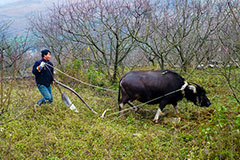Motivation
In the 1990s and early 2000s, although China’s agricultural extension system involved more than 1 million extension workers, millions of Chinese farmers still lacked access to services. In 2005, a reform initiative began to change the top-down agricultural extension system into one that could better address small-scale farmers’ diverse needs and would be held accountable for meeting them. IFPRI research showed that this type of inclusive reform significantly improved farmers’ access to and acceptance of agricultural extension services, as well as their adoption of new technologies.
Outcomes
Researchers from IFPRI and the Center for Chinese Agricultural Policy jointly presented an analysis of this study’s findings to the Chinese government. The researchers recommended scaling up national extension reforms that take the same four distinctive steps taken in the pilot program: (1) include all farmers as targets for public extension services, (2) systematically identify local farmers’ needs for extension services, (3) hold extension agents accountable for providing services, and (4) provide incentives to the extension agents for their services. These findings and recommendations are contributing to the design of agriculture extension policies in China.



